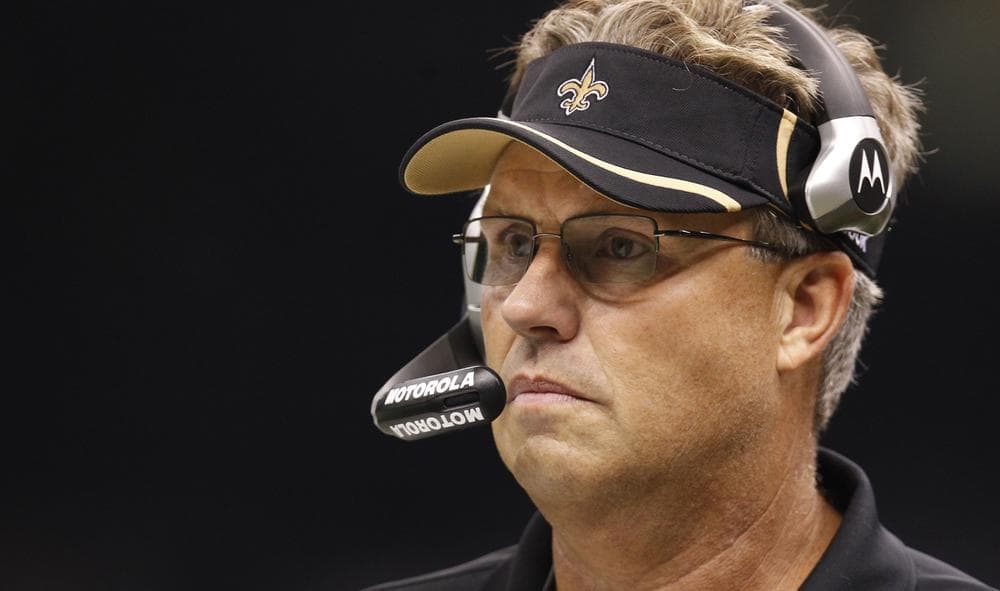Advertisement
NFL Players And Coaches Weigh In On Bounty Issue
Resume
A week ago, the National Football League announced that for the past three seasons, more than twenty defensive players on the New Orleans Saints had participated in a system that paid players for knocking designated opponents from the game.
The so-called "bounty program," was administered by Gregg Williams, who was the defensive coordinator for the Saints. Williams has acknowledged that the program was "a terrible mistake."
On Monday, Commissioner Goodell will meet with Gregg Williams. Certainly he will want to know about the locker room culture in the cities where Gregg Williams previously coached. Were the Titans paid bounties when Williams was their defensive coordinator during the late nineties? Retired defensive end Josh Evans said this week that they were. George Henshaw was the team's offensive coordinator at the time.
"There was none of that at the Tennessee Titans," he said. "I'd never been aware of anything like that, and I would be totally shocked if it went on, and which I know did not."
How about in Buffalo, where Williams was the head coach from 2001 through 2003? Retired safety Coy Wire said this week that a small group of players there "rewarded each other" with a pay-for-play pool "that took things too far." Izell Reese was a defensive back with the Bills during Williams' last season there.
"No. No, I wasn't aware of it at all," said Reese. "And, being a part of the defense, I would think I would have known. There was no bounty system or anything in place to my knowledge which being part of the defense in Buffalo."
The "no's" regarding intent to injure notwithstanding, Henshaw and Reese acknowledge players were paid for big hits. Both men now work with young athletes looking for schools where they can enhance their athletic opportunities. According to Izell Reese, they emphasize sportsmanship. But Reese says that if one of the football players he's mentoring makes it to the NFL, he won't be telling a coach and twenty-odd players involved in a bounty-paying scheme that it's wrong.
Reese said, "it was 'Yes, sir. No, sir. What do I gotta do? What do you want me to do? I've made it. This is all I know in the NFL. I don't know right from wrong and I'm trying to make a name for myself, so whatever coach asks you to do, you just follow suit. You just do what you're told. That's the mentality that goes with being a rookie. You just do what you're told, regardless of what it is."
Bill Littlefield was also joined by Steve Nelson, a former linebacker with the Patriots from 1974-1987, and the head coach at Curry College from 1998-2006, to discuss the bounty issue.
First, Nelson was asked if he had any knowledge of bounty-like programs during his playing days.
"No, I was never on a team that offered any type of money to knock a guy out," he said. "I remember one instance when I was in college, and we were playing a team with a great quarterback, and the defensive coordinator kept talking about this guy, and how good he was. Finally, I said, 'Coach, don't worry. I'm going to knock him out in the first quarter.' And I happened to do it."
"You know, as a defensive player, you understand when the best offensive players aren't on the field, you have a better chance of winning. So if it's before the whistle blows, and it's a legal hit, that's part of the game."
Nelson's answer makes the idea of a bounty system seem superfluous, and Nelson did say that the news of the bounty system caught him off guard.
"I was kind of surprised, to tell you the truth," he said. "The livelihood of all the players is important, especially today, in this day and age of pro football, where so much of the player safety is being scrutinized. The head coach must have known about it - I can't believe they're that much in the dark that they didn't know it was going on, and to have that on different teams, this kind of blows my mind. I don't think anyone can rationalize or justify their actions as being part of the game."
In addition to his perspective as a former player, Nelson spoke as a former coach. We asked him what his reaction would have been if he had heard his players at Curry College discussing money changing hands for knocking out a player on the other team.
"It wouldn't happen," Nelson said. "It doesn't matter if you're in Pop Warner, high school, Division III, or the NFL, it's wrong to target and actively try to hurt players."
This segment aired on March 10, 2012.